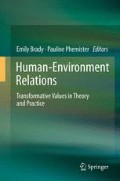Abstract
In this chapter I outline a dilemma. If we resist human/nature dualism by thinking of human beings as embodied and environmentally situated – as natural – then this seems to imply that, as human products, modern environmentally damaging cultures are after all natural. However, claiming that these cultures are alienated from nature seems to return us to belief in human separateness. I explore a solution to this dilemma found in the work of Friedrich Hölderlin. He suggests that nature has divided itself into human subjects and the particular, finite, natural objects of which we are conscious and from which we feel separate. Thus both humanity and natural environments are aspects of nature in an expanded sense, as a self-dividing whole.
For Hölderlin, then, human estrangement from nature – and by extension contemporary environmental crisis – is a product of nature itself. This has the seemingly unhelpful implication that we human beings neither can nor should attempt to prevent this crisis. However, I argue that this quietism is less unhelpful than it might seem. It is motivated by anti-anthropocentrism; it anticipates Heidegger’s scepticism about seeking a technological fix; and it allows for a novel justification of environmentalist practices as ways of preparing for possible change in nature’s way of being.
Access this chapter
Tax calculation will be finalised at checkout
Purchases are for personal use only
Notes
- 1.
Classifying Hölderlin as ‘Romantic’ is somewhat controversial. Dieter Henrich claims that Hölderlin was not a Romantic because he did not subscribe to the Romantic theory of fragmentary, ironic literature, but instead ‘advocated perfection in the formal composition of poems’ (Henrich 2003: 227). However, I treat Hölderlin as a Romantic in the broader sense that he subscribes to an organic metaphysics, as did most other Early German Romantics.
- 2.
Holderlin does not state his reasoning as explicitly as this. I am indebted to the reconstruction provided by Henrich (1997). Frederick Beiser also reconstructs the argument (without specific reference to Hölderlin, although he attributes it to those he calls the ‘absolute idealists’ – Friedrich Schlegel, Novalis, Schelling – amongst whom he numbers Hölderlin) as follows: ‘the very concept of subjectivity makes sense only in contrast to objectivity, a contrast that … works only within experience’ (Beiser 2002: 152).
- 3.
Confusingly, however, Hölderlin calls the natural ‘aorgic’ and the artificial ‘organic’ (see below).
- 4.
- 5.
For discussion of these views, see Nassar (2011).
References
Beiser, F. (2002). German idealism: The struggle against subjectivism 1781–1801. Cambridge: Harvard University Press.
Carr, D. (1999). The paradox of subjectivity. Oxford: Oxford University Press.
Dastur, F. (2000). Tragedy and speculation. In M. de Beistegui & S. Sparks (Eds.), Philosophy and tragedy (pp. 78–87). London: Routledge.
Heidegger, M. (1993). The question concerning technology. In D. Farrell Krell (Ed.), Basic writings (pp. 283–318). New York: Harper Collins.
Heidegger, M. (2000). Elucidations of Hölderlin’s poetry (Keith Hoeller, Trans.). New York: Humanity Books.
Henrich, D. (1997). Hölderlin on judgment and being. In E. Forster (Ed.), The course of remembrance and other essays (pp. 71–89). Stanford: Stanford University Press.
Henrich, D. (2003). Between Kant and Hegel. Cambridge: Harvard University Press.
Hölderlin, F. (1970). In G. Mieth (Ed.), Sämtliche Werke und Briefe (Vol. 2). Munich: Carl Hanser.
Hölderlin, F. (1988). Essays and letters on theory (T. Pfau, Trans.). Albany: SUNY Press.
Hölderlin, F. (1990). In E. L. Santner (Ed.), Hyperion and selected poems. New York: Continuum.
Hölderlin, F. (1994). Poems and fragments (M. Hamburger, Trans.). London: Anvil Press.
Hölderlin, F. (2003). Being judgement possibility. In J. M. Bernstein (Ed.), Classic and romantic German aesthetics (pp. 191–192). Cambridge: Cambridge University Press.
Kant, I (2003). Critique of pure reason. (N. Kemp Smith, Trans.). London: Macmillan.
Mathews, F. (1994). Relating to nature. The Trumpeter, 11, 159–166.
Nassar, D. T. (2011). The absolute in German idealism and romanticism. In A. Stone (Ed.), The Edinburgh critical history of nineteenth-century philosophy (pp. 29–46). Edinburgh: Edinburgh University Press.
Vogel, S. (1998). Nature as origin and difference: On environmental philosophy and continental thought. Philosophy Today, 41, 169–181.
Author information
Authors and Affiliations
Corresponding author
Editor information
Editors and Affiliations
Rights and permissions
Copyright information
© 2012 Springer Science+Business Media B.V.
About this chapter
Cite this chapter
Stone, A. (2012). Hölderlin and Human-Nature Relations. In: Brady, E., Phemister, P. (eds) Human-Environment Relations. Springer, Dordrecht. https://doi.org/10.1007/978-94-007-2825-7_5
Download citation
DOI: https://doi.org/10.1007/978-94-007-2825-7_5
Published:
Publisher Name: Springer, Dordrecht
Print ISBN: 978-94-007-2824-0
Online ISBN: 978-94-007-2825-7
eBook Packages: Earth and Environmental ScienceEarth and Environmental Science (R0)

